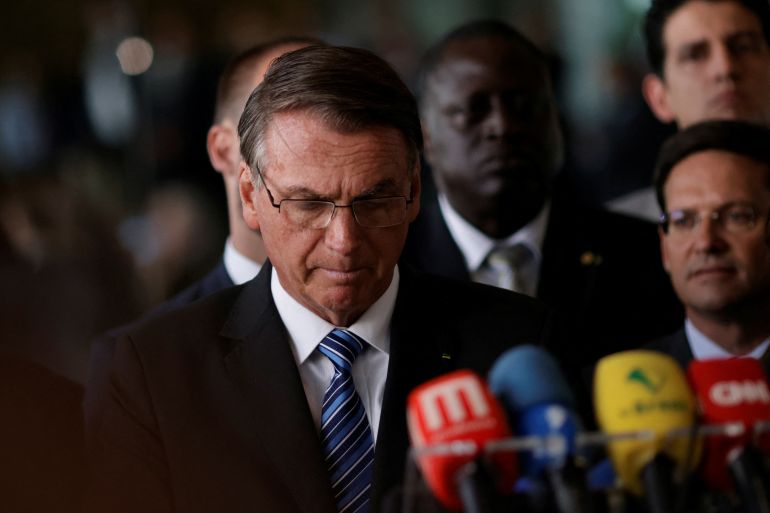After Brazil election loss, what’s next for Bolsonaro?
In a deeply divided country, the far-right outgoing president will not slink into the shadows, analysts say.

Sao Paulo, Brazil – As the results of Brazil’s October 30 presidential runoff rolled in, confirming a slender victory for left-wing icon Luiz Inacio Lula da Silva, his far-right opponent was nowhere to be found.
Allies who sought to commiserate with defeated President Jair Bolsonaro were reportedly told that he had gone to bed after the results came in, neither thanking his 58 million supporters nor congratulating the new president-elect.
Keep reading
list of 3 itemsBolsonaro breaks silence, says will follow Brazil’s constitution
Lula’s comeback: Can he pull Brazilians out of poverty?
This silence continued for almost two days. Heads of state from the United States, France, Germany, Russia, Saudi Arabia and Italy had all congratulated Lula on his victory by the time Bolsonaro gathered the country’s media for his first public post-election appearance.
In a curt speech lasting no more than two minutes, he failed to acknowledge defeat and did not mention Lula’s name. Instead, he saluted small groups of putschist protesters who had gathered around the country, calling for the military to annul the election results and keep Bolsonaro in power.
Crucially, there were some signs of concession. After Bolsonaro vacated the lectern, his chief of staff, Ciro Nogueira, announced that the president had given his approval to begin the government transition process. And before beginning his address to the media, Bolsonaro was heard saying: “They are going to miss us.”
“Bolsonaro was never planning on conceding defeat,” Mario Sergio Lima, a senior Brazil analyst at the Medley Advisors consultancy, told Al Jazeera. “At first, I think he was genuinely stunned that he had lost, as he had surrounded himself with yes men and believed he was going to win. But after that, the prolonged silence was a way to see if the street protest movement would pick up steam.”
In the days following the vote, the countrywide protests by Bolsonaro supporters blocked major highways, as demonstrators openly called for a military coup.
“Bolsonaro has never abided by the rules,” political scientist Beatriz Rey, a visiting fellow at Johns Hopkins University, told Al Jazeera. “He spent most of his presidency criticising the voting system; of course he wasn’t going to concede defeat.”
Balancing act
Bolsonaro had surely hoped that his years of attempts to discredit Brazil’s electoral system would have led to more widespread popular anger at his defeat. But while the demonstrations caused significant disruption, even blocking access to Brazil’s busiest airport at one point, their radical character and insufficient size quickly depleted their value for the outgoing president, and he was forced to ask protesters to clear out.
Fabio Zanini, a political columnist at the Folha de S Paulo newspaper, described Bolsonaro’s behaviour as a “balancing act”.
“On the one hand, he can’t criticise the protesters directly, because that would go against everything he’s defended throughout his presidency,” Zanini told Al Jazeera. “But at the same time, he can’t associate himself with anything too aggressive, such as highway roadblocks, because that could land him in legal trouble.”
The protests have since dissipated, although small groups are still holding vigils outside military barracks in major Brazilian cities.
While Bolsonaro has not yet given up the fight, pre-election predictions that he would barricade himself in office upon defeat ended up missing the mark. His silence appeared to irritate several of his most powerful elected associates, who urged Bolsonaro to concede.
“It doesn’t seem like anyone bought into the idea of a Bolsonaro-led coup,” Rey said. “Since the election, the political system seems to be organising itself and returning to normal.”
Indeed, Bolsonaro’s strategy of silence “certainly backfired to a point”, Lima said: “Bolsonaro has been abandoned by almost every institutional ally he had.”
‘Hard to replace’
At the age of 67 and with more than three decades in politics, Bolsonaro faced his first-ever loss in this election. Two years after being elected as a city councillor for Rio de Janeiro in the late 1980s, he won a seat in the federal Congress. He was re-elected six times until making it all the way to the presidency as an unlikely far-right outsider in 2018.
“Bolsonaro doesn’t know what it’s like to lose,” Zanini said. “Maybe that’s why he’s dealt with defeat so badly.”
The question that remains is what will become of the radical president, and the Brazilian far-right as a whole, now that he is out of office. Crucially, losing public office strips Bolsonaro of his parliamentary immunity. “There are lots of cases pending against him, from during the pandemic, or in relation to organising anti-democratic protests, but he’s unlikely to be jailed as soon as he leaves the presidency,” Zanini said. “But it is something he will have to be careful about.”
Meanwhile, any suggestion that the outgoing president will slink into the shadows appears to be folly. Bolsonaro won more than 58 million votes on October 30, the third-highest vote total ever obtained by a Brazilian presidential candidate, even outstripping his own performance in 2018.
According to Zanini, “no one can compete with Bolsonaro” on Brazil’s far right, drawing a comparison to his US counterpart, Donald Trump.
“Trump came out of the 2020 election as the supreme leader of the American right and is now working on his candidacy for 2024,” he said. “Bolsonaro will do the same for the 2026 election, so he needs to hold on to that hegemony until then.”
There is doubt, however, over whether the broader right wing in Brazil will restrict itself to Bolsonaro, or whether moderate factions will break away.
“There are incentives for the centre right to move away from Bolsonaro, because he’s a loose cannon. They want someone they can rely on,” Lima said. “But, for the far right, it would be hard to replace Jair Bolsonaro.”